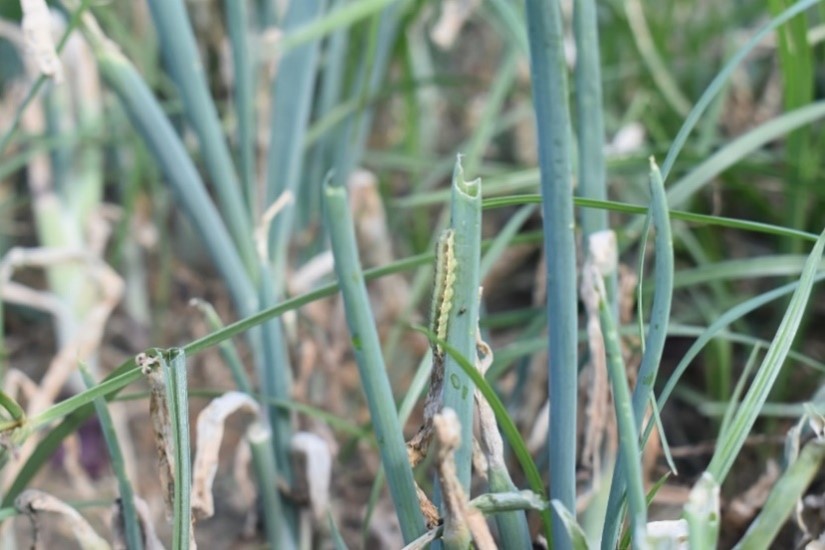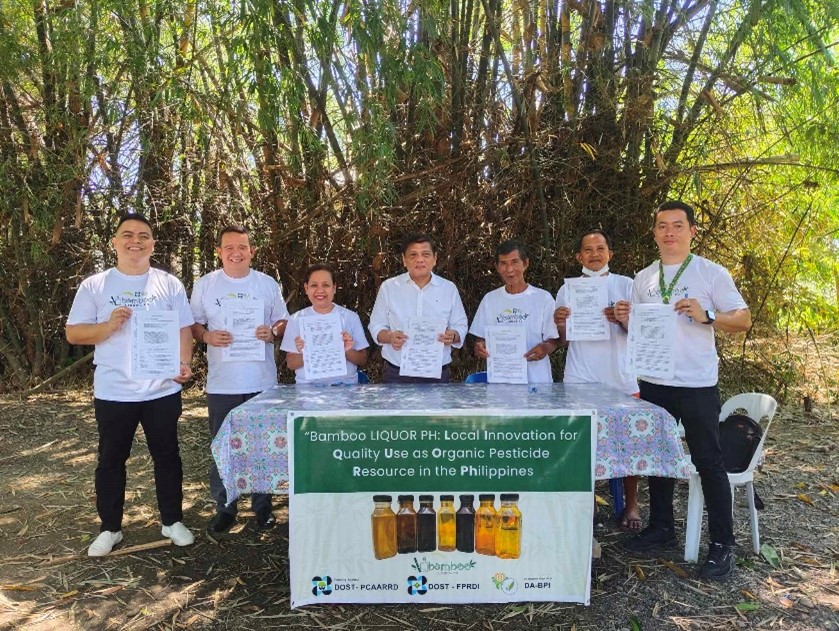The DOST-Forest Products Research and Development Institute (DOST-FPRDI) is eyeing the potential of bamboo to help control armyworm and cutworm attacking onion plantations.
Institute experts will develop formulations and test the performance of bamboo pyroligneous liquid (PL) in controlling onion armyworm (OAW) and cutworm in local onion farms.
PL, a by-product of charcoal production, is derived from the collected and condensed smoke during pyrolysis—a process that heats or burns a plant biomass without oxygen. PL acts as a disinfectant, bathroom deodorizer, organic pesticide, and is commonly used in the medicine, cosmetics and food processing industries.
DOST Secretary Renato U. Solidum Jr. expects innovative uses of and products from bamboo thru this project. “The potential of bamboo as a cost-effective solution to enhance the local production of high-value crops opens exciting market opportunities for our farmers. The study will not only contribute to enhancing agricultural practices but is also seen to drive the local bamboo and onion industries to new heights. We are optimistic that the result of this project will provide solution to the challenges in the production being faced by our onion farmers and open new market opportunities for our bamboo growers”
Titled “Bamboo LIQUOR Ph: Local Innovation for Quality Use of Organic Pesticide Resource in the Philippines,” the project is a collaboration with the Department of Agriculture-Bureau of Plant Industry and funded by the DOST-Philippine Council for Agriculture, Aquatic and Natural Resources Research and Development (DOST-PCAARRD).
“Results of the study can positively affect both the bamboo and onion sectors. A cost-effective and more environment-friendly pesticide from bamboo PL can translate into higher yield and reduced production cost for local onion farmers. It can also open new economic opportunities for bamboo growers who rely mostly on its traditional uses,” explained DOST-FPRDI OIC Director Rico J. Cabangon.
According to Project Leader Jennifer P. Tamayo, several formulations of the bamboo PL will be validated in actual farm setting to test its efficacy, commercial potential, and applicability in minimizing the harmful effects of the cutworm and OAW in onion farms.
Last 22 August 2024, a Memorandum of Agreement was signed between DOST-FPRDI and the Rice, Onion and Corn Growers Association for the field validation trials of bamboo PL. Said trials will be conducted in a half hectare (5,000 sq m) land in Sto. Domingo, Nueva Ecija during the next planting season.

Onion armyworm (Photo courtesy: DA-BPI)
 DOST-FPRDI OIC Director Rico J. Cabangon (center) and Rice, Onion and Corn Growers Association Owner/Farmer Mr. Damaso J. Serrano (3rd from right) lead the MOA signing for the field validation of bamboo PL. Also present are representatives from DA-BPI and DOST-FPRDI project staff.
DOST-FPRDI OIC Director Rico J. Cabangon (center) and Rice, Onion and Corn Growers Association Owner/Farmer Mr. Damaso J. Serrano (3rd from right) lead the MOA signing for the field validation of bamboo PL. Also present are representatives from DA-BPI and DOST-FPRDI project staff.
The research is part of the “Establishment of Philippines-China Joint Program on Bamboo Research” project with China’s Jiangxi Academy of Forestry. The initiative marks the agencies’ shared commitment to pursue advancements in bamboo innovation. Among others, the Phil-China project will provide technical support for the development of bamboo technologies and bamboo industry, and the establishment of a modern bamboo research laboratory at the DOST-FPRDI compound. ### (Apple Jean C. Martin-de Leon & Jennifer P. Tamayo, 31 August 2024)











